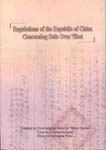Ke Meihuai’s Updated Version of the Tao Te Ching
$15.00
In stock
Description
Ke Meihuai's Updated Version of the Tao Te Ching
Author: Ke Meihuai
Order No. 1212
ISBN-13: 9781622461066
ISBN-10: 1622461061
Binding: Paperback
Publisher: Homa & Sekey Books
Pub Year: 2022
Language: English
Size: 6 x 9
Page: 184
Price: $25.00. You pay only $15.00 (after 40% discount).
About the Book
The Tao Te Ching by Laozi is the philosophical inception of all Chinese thoughts and concepts. There are three most important versions of the book: the original Wang Bi's version, the silk book (versions A and B) and the Chu Jian version. This edition is mainly based on Chu Jian and Version A of the silk book, with supplement of the text of Version B. If the supplement is incomplete, this book uses Wang Bi's version. Both Version A of the silk book and Chu Jian were before the Western Han Dynasty (206 BC – AD 25). It was the period when Laozi rescued the highest prestige and Confucianism was in the doldrums. They were not tampered with by the emperors and Confucianism. It is the intention of the author that readers not be meddled with in the correction and proofreading of Confucian scholars and materialist dialectics.
About the Author
Ke Meihuai is a contemporary Chinese philosopher and novelist. He was a lecturer at the University of Washington and the University of Maryland in the United States in 2019, and a member of the Fifteenth International Humanities Symposium, where his lecture entitled "A Comparison of Ancient Chinese and Ancient Greek Civilizations" won the relevant paper award. He has published, among others, the following books: The Series of Ke Meihuai's works of philosophy, which are Union Theory, Look at Lao Tzu, Origins and Schools of Chinese Thought, The Philosophical Wisdom of Sakyamuni, Commentary of the Four Books of Confucianism, Commentary of Han Feizi, and A Brief Introduction to Western Philosophy and Critique on German Classical Ideas; Two novels: Lives of Madmen: Survival after the Communist Revolution (also known as The Dream in Lake Village) and The Soul of Lotus Lake; and others: The Collection of Ke Meihuai's Short Essays and Poems.
Table of Contents
Chapter 2: Epistemology: The Concept of Symmetry of Genera 5
Chapter 3: Ethics: Good Tao Deduces Three Ethical Principles 7
Chapter 4: Ontology II: The Crossroad of Everything before "Xiangdi" 9
Chapter 7: Ethics: Principles of Longevity and Natural Longevity 14
Chapter 9: Ethics: Criticizing Acts That Violate the Good Way 18
Chapter 10: Ethics: The Content and Goals of Self-Cultivation 19
Chapter 12: Ethics: Temperance against Extravagant Lifestyles That Go against the Good. 23
Chapter 13: Ethics: "You Are Worthy of Oneself" Is the Outlook on Life of Good Knowledge. 25
Chapter 14: Creationism III: The Metaphysical State of the Oneless of Tao 27
Chapter 15: Ethics: Enlightenment and Good People Have the Virtues of "The Great One" (Xuan De) 29
Chapter 16: Movement Theory: Discussing the Cycle of Birth and Death of All Things. 31
Chapter 18: Politics: Exposing the Wisdom and Wisdom of Tyrants 35
Chapter 20: Ethics: Depicting Bad Social Customs and Inharmonious Social Life. 39
Chapter 21: Creationism IV: Depicting the Image World of Creation 41
Chapter 23: Ethics: The Principle of "Honesty Is Returned". 45
Chapter 27: Ethics: Five Goods. 53
Chapter 32: Epistemological Methodology I: The Method of Defining Genera Concepts. 63
Chapter 33: Epistemological Methodology II: Methods of Defining Concepts. 65
Chapter 34: Creationism VI: Summarizing the Qualities and Functions of Taoism.. 67
Chapter 35: Creationism VII: Discussing the Quality and Function of Taoism.. 69
Chapter 36: Creationism VIII: The Fine-Tuned Wisdom of Taoism (Soul) in All Things Themselves. 71
Chapter 38: "Dejing" Program on Ethics and Politics. 77
Chapter 39: Upper and Lower Virtues. 81
Chapter 40: Epistemological Methodology III: Three Different Methods of Understanding. 84
Chapter 41: The Three Basic Principles of Circular Movement 87
Chapter 42: Three Basic Principles of Creation by Dadao. 89
Chapter 45: Politics: Maintaining the True Colors of Nature and Creating a Ching Ming Society. 95
Chapter 46: "Unnecessary Desire" and "Necessary Desire". 97
Chapter 47: Epistemology: Knowledge of Epiphany and Enlightenment 99
Chapter 48: Epistemology: Gradual and Knowledge-Based People’s Political Behaviour 101
Chapter 49: The Saint and the Common People Are in the Same Way: The Kindness of a Whole Body. 103
Chapter 50: Life and Death View and Guarding Life with a Kind Heart 105
Chapter 51: Tao Law Nature and Profound Virtue. 107
Chapter 52: Realizing and Keeping the Soul Holiness. 109
Chapter 56: Self-Cultivation III: The Principles and Virtues of Mysticism 117
Chapter 59: Politics: The First Political Principle: "Only Se (Temperance)". 123
Chapter 62: Political Science: Good Tao Is a Treasure That Both Good and Bad People Want to Use. 129
Chapter 63: Political Science: There Is Nothing Difficult to Plan and Do Things with Good Ways. 131
Chapter 65: Political Science: Two Different Ways of Governing the Country. 135
Chapter 70: Four Requirements of the Military and Three Principles of Political Science. 145
Chapter 71: Principles of Saints’ Military Activities. 146
Chapter 73: Epistemology: Two Kinds of Knowledge. 150
Chapter 74: Political Science: Personal Rights and Freedoms Are Not Permissible to Infringe. 151
Chapter 75: Legal Theory: Natural Law "The Sky Net Is Restored, but Not Lost.". 153
Additional information
| Weight | 1 lbs |
|---|





